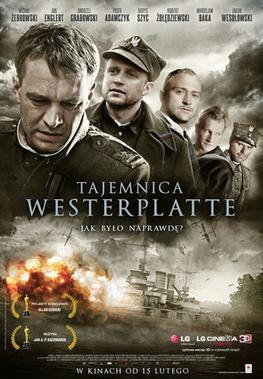“1939 Battle of Westerplatte” is a
Polish-Lithuanian movie written and directed by Pawel Chochlew. It was originally titled “Tajemnica
Westerplatte”. The movie chronicles the
“Polish Thermopylae”. This was the
heroic defense on the Westerplatte peninsula in the harbor of Danzig at the
start of WWII.
The movie opens just prior to
the German invasion of Poland. The
Polish commander on the peninsula is a Maj. Sucharski (Michal Zebrowski). He is
informed that he will have to hold out for twelve hours instead of six. “This is a fight for honor.” He is upset because he has only 200 men. The clock starts ticking when a shell hits
his headquarters. The initial German assault is repulsed with excellent
explosive effects and graphic wounds, but the combat is brief. The next seven days are a series of assaults
followed by lulls in the fighting. The
Germans bring in CGI Stukas, an armored train, and flamethrowers, but the
defenders continue to hold out. The
stress is having an effect on the Poles, but especially on Sucharski. He is suffering from combat fatigue which
looks a lot like cowardice. On the third
day, he wants to surrender. This leads
to command dysfunction as his second in command Capt. Dabrowski (Robert
Zoledziewski) wants to hold out.
“1939 Battle of Westerplatte”
was controversial when it was released.
Some Polish patriots were upset with the less than flattering portrayal
of the defenders, especially Sucharski.
The fact that the word tajemnica means “secret” implied that it was a
revisionist view of the battle. There is
some justification for this viewpoint.
The Battle of Westerplatte was
technically the defense of the Military Transit Depot on Westerplatte
peninsula. The defense was centered on
the fortified barracks as depicted in the film.
The battle opened with bombardment by the battleship
Schleswig-Holstein. This was followed by
an assault by elite German forces which walked into an ambush. A Polish soldier that was killed was the
first death in WWII. The Poles used howitzers and mortars to repulse the
attack. The second attempt was met by
felled trees, barbed wire, and heavy fire.
This and a third attack were also thrown back. The Poles were forced to withdraw to a
smaller perimeter centering on the barracks, but they continued to hold out
against renewed forays and intense artillery and Stuka bombardments. An attempt to set the bridge connecting the
peninsula to the mainland failed when the fire from the train set the woods
afire and allowed the defenders to wreak havoc.
By this time, Sucharski was urging surrender, but Dabrowski took
temporary command to prevent this.
However, Sucharski got his way on the Sept. 7. Only 14 Poles died in the battle so it was
not exactly Thermopylae or the Alamo.
Sucharski came out of the battle as the most decorated hero and the
defense was an inspiration to the Polish nation. The movie tarnishes Sucharski’s reputation,
but not really the rest of the men. If
anything, the Germans come off much worse.
These are hardly elite soldiers.
They are depicted as cowardly and incompetent. Since the Poles are far from stalwart
warriors, it is hard to see why it takes the Germans a full week to defeat
them.
The logical movie to compare
this movie to is “The Brest Fortress” which covers a similar Alamo-type defense
by Soviet troops in the early days of Operation Barbarossa. “1939 Battle of Westerplatte” does not come
off well in this comparison. It is
poorly acted. The dialogue is stilted
and there is too much of it. At one
point, Sucharski actually tells one of the men “You won’t die – that’s an
order.” There is plenty of time for
talking because there is a shortage of combat throughout the movie. There is a lot of fizzle to the events. You expect kick-ass moments, but you get long
stretches of boring. This is
disappointing because the initial combat is fairly well staged. Classic case of bait and switch. The lack of combat leads you to believe that
there is no good reason for Sucharski to surrender. This is a disservice to the men who held out
against incredible odds for a full week.
One thing you can say, the movie is not overly patriotic.
The only positive thing I can
say about the movie is it clued me in on an event in WWII that I was not
familiar with. I was already familiar with
the Alamo and as an American I think I would be upset if a new movie came out
depicting Davy Crockett as suffering from shell shock and wanting to surrender
early in the siege. For this reason I
have to side with the historical critics of the movie.
GRADE = D-

The first WW2 deaths were the townspeople of Wielun killed in a Luftwaffe air raid a few minutes before Westerplatte was attacked.
ReplyDeleteWelcome YOU to GDANSK the city of POLAND and you must see by yourselve the WESTERPLATTE. PLEASE DONT FORGET THE FLOWERS TO THE GRAVE OF THIS SOLDIERS WITH ALL RESPECT. THEY FITH FOR FREEDOM, PEACE.
ReplyDelete